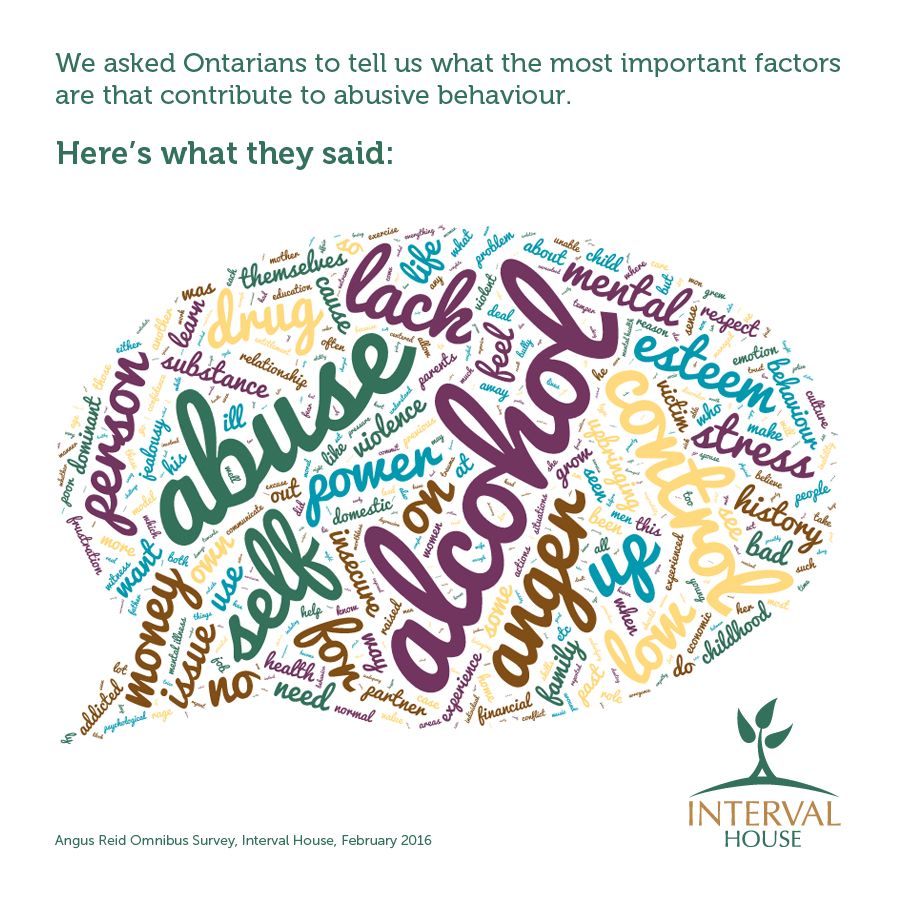
In February of this year, Interval House posed this question to Ontarians through an Angus Reid Omnibus Survey: “What are the most important factors that contribute to abusive behaviour?” We let them answer in their own words and used the most common responses to make a word cloud. Each week for the next month, we’re addressing a common attitude about the causes of domestic violence to investigate: is it true? Or is it a myth? In this post, we answer: does a history of childhood abuse cause abusive behaviour?
One of the most common words used by Ontarians to describe the cause of abusive behaviour was, unsurprisingly, “abuse” – it’s the second most common word used in responses. This is partly because many respondents pointed to childhood abuse as a cause of abusive behaviour later in life; “childhood” and “history” can also be found in the word cloud.
 This is something we often hear: that exposure to abuse as a child leads people to become abusive later in life. Is this true?
This is something we often hear: that exposure to abuse as a child leads people to become abusive later in life. Is this true?
TRUE, SOMETIMES: There are undoubtedly long-term, serious effects of experiencing or witnessing abuse as a child. Studies show that children who are exposed to violence can be more likely to repeat the cycle that they learned and grow up to become either victims or abusers themselves.1
This is true even for kids who aren’t themselves the targets of abuse. Children who witness acts of violence, against their mother or someone else in the home “can be affected in the same way as children who are physically and sexually abused.”2
Children living in a violent environment like this may come to believe that this behaviour is acceptable, and this has long-term consequences for their development. UNICEF writes that, “The single best predictor of children becoming either perpetrators or victims of domestic violence later in life is whether or not they grow up in a home where there is domestic violence.”3
This is why Interval House’s Children’s Program is so important. It’s crucial that we’re able to intervene with kids at a young age, offering them the opportunity to learn about healthy relationships, conflict resolution, self-esteem, and boundaries.
But at the same time, it’s important to note that the relationship between childhood exposure to violence and abuse later in life isn’t a given. While many adult abusers and survivors of violence did grow up with violence in the home, not all children with domestic violence in the home experience violence again later in life.
And not all abusers were abused or exposed to domestic violence as children. While learning these behaviours from a parent or other adult can be a powerful way that violence, power, and control become normalized, it’s not the only way that abusers learn these behaviours. A belief in men’s right to control women, or a desire for power and control can stem from other circumstances. We’ll tackle the root causes of this belief in our final post, next week.
Stay tuned for the final post in our myth-busting series, where we tackle the question: does a desire for power and control cause domestic violence?
- Part 1: What are the causes of domestic violence?
- Part 2: Does substance abuse cause domestic violence?
- Part 3: Does mental illness or anger cause domestic violence?
- Part 4: Does a history of childhood abuse cause abusive behaviour?
- Part 5: Is domestic violence about power and control?
Sources:

